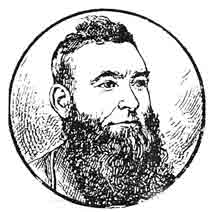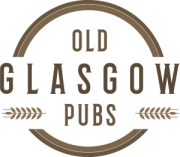13 Old Wynd, off the Trongate, Glasgow.

Mr Alexander Allan. 1893.
In the Old Wynd, off the Trongate, round which centre’s many historical associations and grim stories of a bygone age, there was one of the oldest taverns in Glasgow. At the end of the 1800s it was known as the Waverley Bar, owned by Mr D F Sunter. The date when the Waverley became a licensed house is obscure and uncertain, but there was no doubt whatever that early in the morning of the century it was a popular rendezvous for Glasgow’s old cronies. In the stormy period of the year 1819 and 1820, when the people, groaning under political tyranny, the Waverley was well known and a favourite meeting place of the Rads. It has changed many time since and in 1887 Mr Sunter purchased the property.
The old tavern was full of antiquarian objects, so full that a recess in the wall was crowded with all sorts of interesting and unusual items. There was several old guns, skeletons and skins of extinct animals, one valuable engraving of one of the Lords of Eglinton in his costume of the Ayrshire Yeomanry, so rare that it was the only one known in Glasgow. There was also an interesting relic of Sir Colin Campbell with the memorable speech of the old veteran on bidding a final farewell to the Highland Brigade, the noble brigade that climbed the heights of Alma and won for itself a deathless fame in the military annals of the world.
Mr Sunter was a Paisley man and bred to the trade. Early in his career, he was employed for three years in the Civil Service Stores, London, and there received a training which few men engaged in the trade can claim. Mr Sunter was a wine and spirit Merchant and blended his own whisky, he made the Waverley a prosperous concern. The Old Wynd had a bad reputation, it was a very dark smelly place, it was full of thieves, pick-pockets, prostitutes, gangs of men women and children hung about waiting for an opportunity to commit a crime.
Mr Sunter was a talented artist, and had a very interesting image hanging in his tavern, it represents a policeman thrusting his head in at the door just on the Chap of eleven. His bull’s-eyes flashes on those standing at the bar, and then comes: “It’s eleven o’clock, gentlemen.” Before Mr Sunter took over the tavern, he worked for wine and spirit merchant William Faulds who ran an old howff at the corner of Trongate and Brunswick Street.
It was always disputed what was the oldest pub in Glasgow was, the Institution in King Street or the Waverley in the Old Wynd. The evidence of local antiquarians on the subject was conflicting, but there was no doubt that the tavern in the Old Wynd existed in 1745, the year of dark Culloden, when the vanquished hero of the Stuart race was a fugitive among the northern hills. Mr Alexander Allan the proprietor of the Waverley had title deeds which proved it.
The Waverley tavern still retained many traces of it’s original appearance, despite the necessity of adapting and modernising much of it to the wants of the time. Mr Allan paid a lot of money for this old pub at the end of the 1800s and did not keep it for long as the City Improvement had the Old Wynd swept away around 1901. Alexander Allan was a true Scotsman and formerly owned the Auld Hoose, an old licensed house in Alloa, from there he went to the Ferry Inn, South Alloa and after a few months purchased the Waverley, Old Wynd.
Facts…
License Holders.
1875 James Walter.
1892 D F Sunter.
1899 Alexander Allan.
In the 1840s the New Wynd, Old Wynd and the Back Wynd all had tavern’s in them. The Ayrshire tavern was at no66 New Wynd also Hillcoat’s extensive Bar. At no6 Back Wynd the Crown and Anchor was a popular old Tavern.
